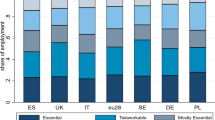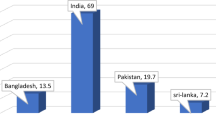Abstract
International financial institutions (IFIs) like the International Monetary Fund and the World Bank often have used the leverage afforded them through their loan mechanisms to demand domestic labor market flexibility. At the same time, the International Labour Organization’s call to respect Core Labor Standards (CLS) in the global economy has increasingly gained acceptance since 1998. CLS that sanction freedom of association and collective bargaining have been particularly emphasized by the ILO since these are collective rights that enable the exercise of other rights. While IFIs have generally held to free market principles, new research findings and international pressure has led the IMF and World Bank to be more open to the idea of core labor standards. Implementation has often lagged, but some advances have been made. This includes the World Bank’s commitment to ensure respect for CLS through its private sector lending arm. Yet to be seen is whether these policy shifts will lead to greater respect for labor standards or whether the continuation of market-oriented reforms will further undermine labor’s collective power, creating new challenges for future resistance.



Similar content being viewed by others
Notes
Some 29 of these Conventions have been shelved or withdrawn; see www.ilo.org/ilolex.
The Digest is available at www.ilo.org/ilolex/english/index.htm.
The ILO defines essential services as those in which the interruption of service would endanger the life, personal safety, or health of the whole or part of the population. The hospital sector, electricity services, water supply services, telephone service, and air traffic control qualify as essential services.
According to the Norwegian Ambassador to the WTO at the time, Terje Johannessen, “it took two full nights to draft this paragraph. There were still many lingering doubts about the wording, but when the US supported the paragraph, the issue was decided.”
www.imf.org/external/np/exr/facts/glance.htm; accessed December 21, 2005
It is worth noting that, since the 1980s, no developed countries have resorted to IMF support due to their aversion to the Funds conditionality (Buira 2003: 7).
All ratifications of Convention 182 on the worse forms of child labor have taken place since 1998 because the convention was not initiated until 1999.
For unionization rates for Brazil, see the Instituto Brasileiro de Geografia e Estatística (IBGE). Unionization rates in Costa Rica and Honduras come from the ILO.
These letters of intent are available online at www.imf.org/external/np/loi/mempub.asp?view=loi&sort=cty. The sample is partial since the IMF does not release letters of intent for 5 years, unless the borrowing government agrees to their public release.
Failure to meet IMF conditions results in a suspension in disbursements. Thus, disbursement rates are an indication of compliance, and a disbursement rate of 75% or higher can be considered an indicator of compliance (Buira 2003: 8). Only a fraction of programs end early due to extreme success (Mussa and Savastano 1999: 15).
The ICFTU has tried to hold the World Bank to its word, and after the former publicized labor rights abuses by Grupo M, the Dominican Republic’s largest export processing zone operator, the IFC required Grupo M to respect all of the CLS as a condition of the loan (ICFTU 2006b).
References
Aidt T, Tzannatos Z. Unions and collective bargaining: economic effects in a global environment. Washingon: World Bank; 2002.
Alston P. “Core labor standards” and the transformation of the international labor rights regime. Eur J Int Law. 2004;15(3):457–521.
Alston P. Facing up to the complexities of the ILO’s core labour standards agenda. Eur J Int Law. 2005;16(3):467–80.
Anner M. The international trade union campaign for core labor standards in the WTO. Working USA: J Labor Soc. 2001;5(1):43–63.
Anner M. The paradox of labour transnationalism: trade union campaigns for labor standards in international institutions. In: Phelan C, editor. The future of organised labour: global perspectives. Bern: Peter Lang Publishing; 2006. p. 63–90.
Bakvis P. Labor standards and development. Presentation to the World Bank Conference on Development Economics; 2002.
Bakvis P. How the World Bank and the IMF use the Doing Business report to promote labour market deregulation in developing countries. Washington: ICFTU/Global Unions; 2006.
Bakvis P, McCoy M. Core labour standards and international organizations: what inroads has labour made? Bonn: Friedrich-Ebert-Stiftung; 2008.
Bhagwati J. Trade liberalization and ‘fair trade’ demands: addressing the environmental and labor standards issues. World Economy. 1995;18:745–59.
Bhagwati J. In defense of globalization. New York: Oxford University Press; 2004.
Buira A. An analysis of IMF conditionality. G-24 Discussion Paper Series; United Nations and the Center for International Development, Harvard University; 2003.
Caraway TL. Freedom of association: battering ram or Trojan horse? Rev Int Polit Econ. 2006;13(2):210–32.
De Rato R. Latin America: structural reforms and competitiveness. Remarks at the Mexican Bankers Association Convention, Acapulco, Mexico, 2006.
Erodad. World Bank and IMF conditionality: a development injustice. Brussels: European Network on Debt and Development; 2006.
Fischer S. A role for labor standards in the new international economy? Comments at IMF seminar and panel discussion, September 19, 1999. Available at www.imf.org/external/np/tr/1999/tr990929.htm. Accessed 7 Sept 2005.
Freeman RB. Labor market institutions without blinders: the debate over flexibility and labor market performance. National Bureau of Economic Research Working Paper 11286; 2005.
Golub SS. International labor standards and international trade. IMF Working Paper WP/97/37; 1997.
Hagen KA. Policy dialogue between the International Labor Organization and the International Financial Institutions: the search for convergence. Geneva: Friedrich Ebert-Stiftung; 2003.
Holzmann R. A role for labor standards in the new international economy? Comments at IMF Seminar and Panel Discussion. September 19, 1999. Available at www.imf.org/external/np/tr/1999/tr990929.htm. Accessed 7 Sept 2005.
ICFTU (International Confederation of Free Trade Unions). Reform of the IFIs to create effective instruments against global inequity and financial instability: Trade union statement to the 2006 annual meetings of the IMF and World Bank. Singapore, 2006a.
ICFTU (International Confederation of Free Trade Unions). Fighting for alternatives: cases of successful trade union resistance to the policies of the IMF and the World Bank. Brussels; 2006b.
IFC (International Finance Corporation). Increasing impact: the year in review 2006. Washington, DC: International Financial Corporation, World Bank Group; 2006.
ILO (International Labour Organisation). Recent developments concerning relations with the Bretton Woods Institutions. 267th Session of the Governing Board, Committee on Employment and Social Policy; 1996. Available at www.ilo.org/public/english/standards/relm/gb/docs/gb267/esp-2.htm. Accessed 23 Feb 2007.
ILO (International Labour Organisation). ILO relations with the Bretton Woods Institutions. 270th Session of the Governing Board, Committee on Employment and Social Policy; 1997. Available at www.ilo.org/public/english/standards/relm/gb/docs/gb270/esp-3.htm. Accessed 23 Feb 2007.
ILO (International Labour Organisation). First supplementary report: ILO activities in response to the financial crisis in East and South-East Asia. Report of the Director-General, 273 rd Sessions of the Governing Body, November 1998. Available at www.ilo.org/public/english/standards/relm/gb/docs/gb273/gb-14-1.htm. Accessed 23 Feb 2007.
ILO (International Labour Organisation). ILO relations with the Bretton Woods Institutions. 276th Session of the Governing Body, Committee on Employment and Social Policy; 1999. Available at www.ilo.org/public/english/standards/relm/gb/docs/gb276/esp-5.htm. Accessed 23 Feb 2007.
ILO (International Labour Organisation). ILO relations with the Bretton Woods Institutions. 279th Session of the Governing Body, Committee on Employment and Social Policy; 2000. Available at www.ilo.org/public/english/standards/relm/gb/docs/gb277/pdf/esp-4-add1.pdf. Accessed 23 Feb 2007.
ITUC (International Trade Union Confederation). World Bank takes major step on labour standards. ITUC Online 2006, 14 December.
Khan MS, Sharma S. IMF conditionality and country ownership of programs. IMF Working Papers; 2001.
Langille BA. Core labor rights—the true story (reply to Alston). Eur J Int Law. 2005;16(3):409–37.
Lloyd V, Weissman R. Against the workers: how IMF and World Bank policies undermine labor power and rights. Multinatl Monit. 2001;22(9):7–11.
Martin W, Maskus KE. Core labor standards and competitiveness: implications for global trade policy. World Bank, unpublished; 1999.
Maskus KE. Should core labor standards be imposed through international trade policy? Washington: The World Bank; 1997.
Maupain F. Revitalization not retreat: the real potential of the 1998 ILO Declaration for the Universal Protection of Workers’ Rights. Eur J Int Law. 2005;16(3):439–65.
Mussa M, Savastano M. The IMF Approach to economic stabilization, IMF Working Paper 104; 1999.
OECD (Organization for Economic Cooperation and Development). Trade, employment and labor standards: a study of core workers’ rights and international trade. Paris: OECD; 1996.
OECD (Organization for Economic Cooperation and Development). International trade and core labor standards. Paris: OECD; 2000.
Pincus JR, Winters JA. Reinventing the World Bank. In: Pincus JR, Winters JA, editors. Reinventing the World Bank. Ithaca: Cornell University Press; 2002. p. 1–25.
Rittich K. Core labor rights and labor market flexibility: two paths entwined? In International Bureaus of the Permanent Court of Arbitration. Labor law beyond borders: ADR and the Internationalization of Labor Dispute Settlement. Netherlands: Kluwer Law International; 2003. p. 157–208.
Rubin R. Statement before the Development Committee of the 59th meeting of the Joint Ministerial Committee of the Boards of Governors of the Bank and the Fund on the Transfer of Real Resources to Developing Countries, Washington, 1999.
Stiglitz JE. Globalization and its discontents. New York: W.W. Norton & Co.; 2002.
Wade R. Showdown at the World Bank. New Left Review. 2001;7:124–33.
World Bank. World development report 1995: workers in an integrating world. New York: Oxford University Press; 1995.
World Bank. Core labor standards and the World Bank. 2000. Available at wbln0018.worldbank.org/HDNet/HDdocs.nsf/0/65510796ed04ac1685256961004c6e7c?OpenDocument.
World Bank. Doing business in 2005: removing obstacles to growth. New York: Oxford University Press; 2005a.
World Bank. World development report 2006: equity and development. New York: Oxford University Press; 2005b.
Author information
Authors and Affiliations
Corresponding author
Rights and permissions
About this article
Cite this article
Anner, M., Caraway, T. International Institutions and Workers’ Rights: Between Labor Standards and Market Flexibility. St Comp Int Dev 45, 151–169 (2010). https://doi.org/10.1007/s12116-010-9064-x
Published:
Issue Date:
DOI: https://doi.org/10.1007/s12116-010-9064-x




